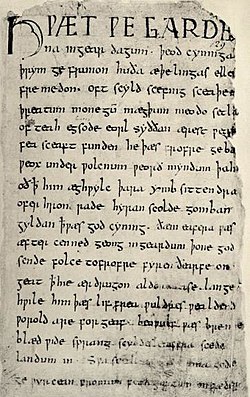Oh well, I ventured out into the fog yesterday all the same, because if was "Teaterns dag", the day of the theater. You only pay about seven dollars to see as many plays as you have time for in a day.
So I saw three plays and... okay, I guess. The first thing I saw was only a few excerpts from some plays. One was Beowulf! http://en.wikipedia.org/wiki/Beowulf wrote:
Beowulf ( /ˈbeɪ.ɵwʊlf/; in Old English [ˈbeːo̯wʊlf] or [ˈbeːəwʊlf]) is the conventional title[note 1] of an Old English heroic epic poem consisting of 3182 alliterative long lines, set in Scandinavia, commonly cited as one of the most important works of Anglo-Saxon literature.

Remounted page from Beowulf,
British Library Cotton Vitellius A.XV,
en.wikipedia.org
British Library Cotton Vitellius A.XV,
en.wikipedia.org
I love the first word of Beowulf, "HÞÆT". It is clearly the same word as the Scandinavian "vet", "know". So Beowulf begins with an exhortation, "Know!" I love it.
We didn't get to see much of Beowulf at all during "Teaterns dag" yesterday. In fact, we were shown nothing, but the actors talked about Beowulf and read some lines from Beowulf in Old English. It was fun to listen to!

Beowulf's burial mound
in Västergötland, Sweden.
http://beowulf.software.
informer.com/wiki/
in Västergötland, Sweden.
http://beowulf.software.
informer.com/wiki/

Edward Tulane doll made by The Raggy Rat Lady XXX
While I was listening to the actors talking about Beowulf, I had a huge bunny rabbit puppet dressed in a white tie and tails sitting in the chair in front of me! Yes, because the bunny rabbit was Edward Tulane, and that was another story, a kiddie story about a spoilt bunny rabbit doll who is washed into the sea and is forced to learn about life and love. Anyway, it was quite surreal having that rabbit sitting in the chair in front of me, as if I had stumbled right into Alice in Wonderland or something!

Photo: Sydsvenskan

Sally is about to be saved by a friendly sailor.
Photo: Peter Westrup.
Photo: Peter Westrup.

Finally, I saw something called "Den hypnotiska tapeten", The Hypnotic Wallpaper. The premise of the play was that in the 1970s, the supremely ugly and wildly patterned wallpapers that people looked at all day made them crazy and made them want to "transcend". Looking at a 1970s wallpaper for any length of time affected people in the same way as, say, LSD. The play seemed to say that in the 1970s people had ugly hairstyles and wore ugly clothes and were slightly out of their minds. Well, I don't know. I remember the 1970s rather fondly, and I and my friends were not crazy, and we weren't doing drugs. Even our wallpapers were moderately OK!
But the people in the play danced well, or danced enjoyably (which is not always the same thing). Some of the music they played while they danced was really good, too. Even so I was slightly irritated at the whole thing, but the rest of the audience applauded and stomped their feet, so maybe I was the one being ungrateful!
Ann

